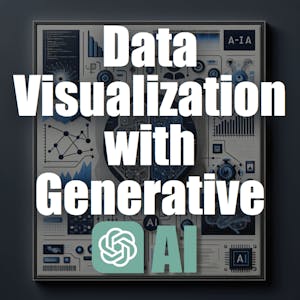Data Visualization with OpenAI API: Generate code with GenAI
About this Course
In this 2-hour long project-based course, you will learn the basics of communicating with the OpenAI API through prompts specifically designed for Python code generation aimed at data visualization and analysis. This course is tailored to address a unique real-world scenario where you have been hired by an online toy store company called Toy Trendz to help them analyze their product sales data. They have provided you with a sales dataset related to the year 2018 and have presented analytical questions that require effective visualizations. The challenge in this project lies in Toy Trendz\'s desire for a system that can convert human language into visualizations based on the data. You will start by learning how to effectively prompt GPT-4 to generate Python code, unlocking the power of natural language understanding to create customized data visualizations. To get the most out of this course, you\'ll need access to the OpenAI API and a basic understanding of data analysis concepts, including data types, data manipulation, along with some familiarity with Python. This course is for those who are experienced data analysis with at least a basic knowledge in Python and want to explore the exciting applications of generative AI in data visualization and analysis.Created by: Coursera Project Network

Related Online Courses
This Specialization aims to take learners with little to no programming experience to being able to create MATLAB programs that solve real-world problems in engineering and the sciences. The focus... more
This is a self-paced lab that takes place in the Google Cloud console. Use BigQuery to explore the NCAA dataset of basketball games, teams, and players. The data covers plays from 2009 and scores... more
This is a self-paced lab that takes place in the Google Cloud console. In this lab, you will learn how to use the Gemini API context caching feature in Vertex AI.Created by: Google Cloud more
As a follow-on course to \"Linear Kalman Filter Deep Dive\", this course derives the steps of the extended Kalman filter and the sigma-point Kalman filter for estimating the state of nonlinear... more
This course is an introduction and an overview to the basic principles of cybersecurity Governance and Strategy. It provides guidance on determining information security objectives and how to... more








